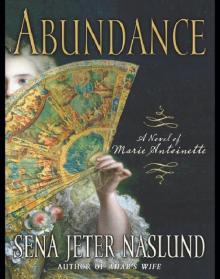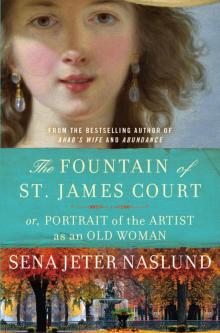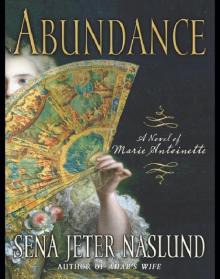- Home
- Sena Jeter Naslund
Abundance: A Novel of Marie Antoinette Page 2
Abundance: A Novel of Marie Antoinette Read online
Page 2
“You make too much of me,” I say gently and smile.
“How prettily she speaks.”
“They will adore her,” they say.
Emotion plays within their words as fragrance lives in flowers; their sympathy for me is fringed with fear.
Suppose the French do not adore me, neither the King, the Dauphin, nor the people?
“My sorrow is to leave you behind,” I say, performing serenity, but, lo, now I myself experience that feeling I have invented for their dear sakes.
Turning to embrace them once more—how strange to embrace someone who wears clothes, when you yourself wear none! Their skirts rustle and creep against my bare thighs, while their own firm legs are veiled in layers of fabric. My skin brushes against their silk ribbons, a stripe of velvet, hard jewels sewn against the colors of their skirts.
Unclothed, I feel less human than they, in their finery.
From outside this chamber, Mops barks once, distantly, in his high, sharp voice. Punctuation! my mother, the Empress, humorously used to say of such unexpected assaults on the ear.
Quickly, quickly, my darling Austrian attendants dress me in a chemise of creamy French silk, then come the sterner, scratchier petticoats from Paris. The soft stockings, they say, were knit in Lyons (but where is that?), and tapered-toe shoes made at their court—Versailles, and next the lilac skirt and bodice of gold, laced tight, and oh, snowy lace, half made of airy nothing, settles around my throat. Tenderly, I touch my neck and feel my skin, more delicate than swan’s down.
Does Mops still wear his blue silk collar, the silver buckle that I fastened this morning with my own fingers? They’ve carried him away.
In the place of furry Mops comes the stately Prince Starhemberg. Perhaps he is really Mops in disguise, transformed by fairies! If my sister, my best and dearest sister and also dearest friend, if my Charlotte were with me, she would smile at my fancy. Her sensibility is with me: they can never pry it from my soul! The Empress has selected Prince Starhemberg—short, sturdy, wrinkled of face—to be my trusted escort all the way to the depth of France, but I feel alone.
Clenching my fingernails into the heels of my hands, I wish again for my sister Maria Carolina, whom I call affectionately Charlotte, who loved just my own favorite card games and music and theatricals and sleighing and fun. I miss my Charlotte, already married and become the Queen of Naples, but I carry her in my heart. Have your fun, daughters, the Empress used to say, before there are marriages and deaths, and alliances to be made. She spoke to all of us, not necessarily to me, mostly forgotten, being the daughter in tenth place in the chain of diplomatic marriages, hence, tenth in my mother’s hopes—and love. Have your fun, she would say, exhaling a long slow breath that reminded me of the north wind, for life is not all play.
I look at the prince whose eyes are like my mother’s—direct, knowing, discreet. Then, can I trust him? I must, for I am clothed and named now in the French manner, and it is time to cross over, my hand in the crook of his arm.
When I hear the waters of the Rhine swirling around this island, I hear the sound of panic, even through the walls. Or is it the rushing of my blood through the vessels of my heart? Here the walls are smothered in tapestries; I gaze at myths of ancient, woven worlds, crowded spectacles that Prince Starhemberg and I must walk past. I see a feast table surrounded by flowers, lilies and roses. In a wedding scene, the banquet table is heavily laden; there, in a blue bowl, threaded apples sit beautifully round and red.
Dressed in the lavender loveliness of France, laced up with golden cord, I progress in my new silk shoes, which fit strangely and tip my body at an unfamiliar angle. I must move forward. The angle itself propels me. Does Louis Auguste try to visualize me? By chance, is he walking toward me at this moment? Does he reach out his hand—but pause, instead, to pick up a book bound in red leather and stamped with gold? I fear he may prefer reading to conversation, no matter how polished the phrases or how musical the tone of voice. I do not like to read. I prefer the garden—mille fleurs— to the library and its myriad, unfathomable books.
At home, my mother must be conferring with her ministers. In Vienna, brilliant men lend the suppleness of their minds to that of majesty, but I fear both women and men who are too bright and knowing. My older sister Marie Christine was very clever—and cruel—to us little ones, but she is the daughter most loved by our mother. Marie Christine wanted us to feel that we didn’t count. Perhaps my mother regrets that she could not make Marie Christine the Dauphine. Yet Fate, as well as my mother, has dealt me a card of Importance that far outweighs what marriage brought Christine. My hand on Prince Starhemberg’s velvet arm, I will myself not to tremble as we walk forward, my curved French heels sinking into the deep rug.
Through a short hall, twenty steps traverse this conduit, and I am delivered to a room the twin of the Austrian one, left behind. Again, the walls are covered with tapestries.
A red velvet cloth cloaks a table, which, I have been told, represents the boundary of France, where stand her emissaries, waiting. My womb lurches within me, and I think of my disgrace should my blood flow now—at this moment. It is too soon, far too soon! Let it be my stomach, not my womb, that seizes itself! The boundary velvet is a hue exactly like that produced by my own body at the monthly visitation of our “Générale Krottendorf.” You may think of me and of home, my mother told me, when there are moments of special difficulty. In France, I have faith, my buds of breasts will surely begin to swell and blossom, and I am not to doubt that this ripening will occur any more than I could doubt that the spirit of my mother the Empress, when it is her time to die, will join my beloved papa, who was her true companion, in heaven.
The maturation of my bosom is as sure as the resurrection of the body. It is my stomach and not my womb that lurches, because my womb renews itself with its red tides later than it should but never earlier. Or is it earlier, and never later? Charlotte says the moon is a perfect clock for the arrival of her Générale, but my clock is erratic, and in what phase is the moon tonight? My mother does not like this irregularity about me, though she agrees it is beyond my controlling. Not me, but Générale Krottendorf commands the blood red tides, which some call the curse and my mother terms the blessing.
When my body ripens, inadequacy will be replaced by abundance. My breasts—my mother lifted two crystal goblets toward me, showing me the size and shape of their clear, capacious bowls—will fill such cups. Nonetheless, at this moment my lungs have become monstrous hands to wring my heart as I pass round the end of their table.
I CANNOT SPEAK! But my body, rushing forward, speaks for me.
I fling myself into the arms of Her, the French Comtesse de Noailles, who is to become my Maternal Guide—my mother, as I grow in France to womanhood.
In the very moment of flinging myself forward, I have remembered the flight of a cherub, a genius, a tiny body, surely winged, who did not hesitate but flew across a stately room. Mozart! age six, just my age, his astonishing performance at the keyboard completed, hurled himself to his destination, my mother’s lap, where he was kissed and welcomed. “Now do you love me?” he not so much asked as demanded. Led by the fluttering wings of infant genius, I hurl myself spontaneously, only fourteen! without restraint, toward Her, the Unknown.
I am not welcome. No arms encircle me. From such blank rigidity, I rebound. The Comtesse de Noailles stands straight as a column, a body animated by no spirit. My eyes seek her face, a nose squeezed between two large circles of rouge. Her tiny mouth is moving.
Her words plank down like dead notes: there is no music in her speaking. She rebukes me for my impulsiveness: “You breach etiquette.” I must loosen my embrace, step back, give the appropriate ceremonial embrace first to the Comte de Noailles. “To my husband, first,” she instructs, “not because of his French noble rank but because he is a Grandee of Spain as well.” True, I have forgotten his rank, though in the past, in Vienna, all their lineages have been memorized.
With perfect grace, though perhaps I blush, I comply with her request. Madame Etiquette, I dub her, secretly.
I meet all the new ladies-in-waiting. Yes, etiquette, plus formality, is their concern, but I will speak from my heart, in spite of them, with my own lightness. How kind of you…. Enchanté. My curtsies are as sure as a series of dance steps, a theme with slight variations, each nuanced, perfectly graceful. I twinkle and charm; my rosy blush, my lifted chin, my cherub cheeks, all partake most exquisitely in the minuet of manners. They cannot resist.
And now, I am French.
But one who will be Queen.
LIKE EVERYONE, I am alone inside this pearly flesh—and I am afraid.
STRASBOURG
The hooves of the horses clatter over the bridge that joins the neutral island to the land beyond.
“To France,” I remark conversationally to my companions within the crimson coach.
The Comtesse de Noailles clears her throat. The eyes of all the others merely look straight ahead, avoiding my gaze.
“More exactly,” Madame Particular says, “the horses’ heads are turned toward Strasbourg, which despite its Germanic name, we know to be thoroughly French.”
I smile at her with utmost friendliness. “Yes,” I say, being very careful of my French accent, “to my great delight, we shall soon be in Strasbourg.”
“Not so very soon,” she replies.
“I believe they are prepared to greet us most ceremoniously,” I add. “Even the children of the city will bring me flowers and extend their warm best wishes.”
“It is a nice enough town, I’m sure,” she replies.
Perhaps she would like a little silence now. The Empress has told me to beware of too much curiosity and of chattering.
As in Adam all die, so in Christ are all made alive, my mother said devoutly. She slid off her chair to her knees and made the sign of the cross. Her black-clad arm swept across the dark widow’s fabric covering her ample breasts. To think that I am her fourteenth child! God has made her a fountain spilling children instead of waters. I have not yet made a bosom companion of Jesus, but the Empress promises that he will come to me and help me whenever I truly call on him or any of the saints.
Mortality is a cause for humility, she said to me. None of us knows when he might be taken, as your blessed father was taken. Death, like birth, comes to us all, regardless of rank or station in life.
Yes, I understood and do understand how this idea is true. It could be the will of God suddenly to strike the Comtesse de Noailles dead, though that would be terrible, and I by no means wish for such an event. God could also strike me dead. At any moment my heart might stop beating. I press my fingertips against my breastbone. Very faintly, I feel the thumping behind the bone.
And yet, you were born to become a queen, my mother the Empress went on. We believe in the divine right of kings and queens to rule, just as we believe in the right of God to do with us as He wills. People are born to their station in life, still you must take instruction now, and by letter, when you are away in France, as how best to prepare yourself for the day when God will take His Majesty Louis XV to heaven, and you and the Dauphin will become the King and Queen.
She told me that she had counseled Amalia and Charlotte before their marriages, just as she was advising me. She told Amalia that because she would be a foreigner in Parma she must conform to the wishes of her husband, or she would be greatly disliked. You, too, will be a stranger and a subject, she told me, drawing me to sit on her knee. Because her stomach is so large, her knee was a small perch, and I feared I might slip right off the black satin.
The Empress said she also had told Charlotte not to draw comparisons between Austrian customs and those of Naples. Charlotte, like yourself, has been chosen as a queen, not a mere duchess, like Amalia, she said to me, and I could tell that she loved Charlotte more, though she loves Marie Christine most of all and let her marry somebody she knew—Albert. When Amalia wanted to marry Charles of Zweibrücken, whom she truly loved, our mother told her she must marry otherwise, for the peace of Europe and the good of Austria. Fortunately for me, I do not love anybody else.
I hope France’s Louis Auguste is nicer than Charlotte’s Ferdinand, King of Naples. Even though Ferdinand is seventeen, we learned through our ambassador to Naples, Ferdinand likes to play tricks on the courtiers and make them trip and fall. Once he even chased somebody with his chamber pot, full of stinking discharge.
The Comtesse de Noailles says, “The Archduchess, Madame la Dauphine, has thought of something amusing. Do share it with us, if you please.”
“Pardon me,” I reply. “It is only a family memory. I feel that I should devote my thoughts to the future, rather than the past.”
Loyal Prince Starhemberg says in his mild way, “Of course you are quite correct about that, Madame la Dauphine.” He looks out his coach window to signify that the matter is closed.
Charlotte says that King Ferdinand himself does not stink, though he is quite ugly. I hope he has nice eyes. We cannot control what kind of head our eyes are stuck into, but eyes themselves convey expression, and that reflects the soul.
Because my mother has spies everywhere, she sees or learns about everything important that occurs all over Europe. I overheard somebody tell her that King Ferdinand of Naples said the morning after his wedding night that our beloved Charlotte slept like a dead woman and sweated like a pig. I hate him for that crude speech, uttered so carelessly that it made its way back to Vienna. And what did he do to Charlotte to make her sweat?
In France, I shall find a friend whom I can love as much as Charlotte.
A FRIGHTFUL BOOM shakes the air.
They are firing the cannon in Strasbourg, this first of the French cities that I will someday rule as queen. Looking out the coach window and over the tops of the chestnut trees, I see a church tower and a joyfully swinging bell. All around our coach, bells are ringing. Their clappers are almost knocking themselves through the iron sides of the bells to express the excitement of the people. The exuberance of it all!
And here they parade! A troop of Strasbourg children in white, in the costumes of shepherds and shepherdesses come from fairyland, to greet my carriage. These children dressed like shepherds and shepherdesses seem like little lambs in all their natural innocence.
The coach stops; the door is opened; they crowd forward, holding up baskets of flowers to me, and I bend to put my nose into their sweet colors. When I look into their faces, I smile with all my heart at these lovely children. They are neither French nor Austrian, but simply children. In response to my smiles, their faces brighten from within. Like the sun, I can shine upon them and make them happy.
I know a truth: my greatest pleasure will always be to give my subjects pleasure.
I step down to stand among them. It is the impulse of my body that instructs me, and Prince Starhemberg murmurs approval. To express majesty, I stand tall, but my backbone remains supple like that of a good dancer, never stiff. As I walk beside the slowly moving coach, the children frolic ahead to strew my path with flower petals, pink, white, red, mauve, and yellow. Here are young maidens in their best dresses to toss before me small bouquets, the stems of the flowers bound together with thread or a prized ribbon, which sometimes I stoop to gather.
All these fair young people are intoxicated with happiness. In reassuring them with smiles and a pleasant countenance, I reassure myself.
I gasp: their fountains are gushing red! But the liquid is only wine.
In the square, whole oxen are roasting, and they perfume the air with their hearty aroma of crisping fat. From huge baskets members of the town council are handing small loaves of bread to the poor. In the trees hang glass balls, colorful as overblown fruit. All around me are the matrons and tradesmen and ancients of the city, with dark blue dresses and yellow shirts, and some still in their brown leather aprons, and white blouses edged in red thread. With my heart clapping against my ribs as hard as those iron tongues against
their bells, I stand in the middle of it all, radiating love to the good people of my new country.
Waiting for me on a high platform are the nobles and clerics and the civic dignitaires, all of them dressed in silks with colors as rich as emeralds, sapphires, rubies, and topaz, and these gleaming fabrics are further adorned by wide lace collars and starched lace cuffs. Most splendid is the Prince Louis de Rohan, whose lace collar is a wondrous web of intricate white threads. Though he is destined to become a prince of the church, like his uncle, he smiles at me as though he would like to invite me to dance. Demurely, I lower my gaze.
The dignitaires request me to climb the steps to their platform, where I can be seen by those even at the edges of the vast, joyful crowd. The people’s pleasure in me and my pleasure in these simple folk of France form a true alliance. When speeches of welcome begin, in the German language, I gently interrupt and say to the gracious orator, “Don’t speak to me in German. From now on I want to hear no other language but French.”
The people howl with pleasure, so much do they approve of my gentle statement. The mayor and dignitaires are surprised by the firmness of my direction, and so am I. All their mouths stretch wide, smiling at my request for the French language. So delectable is the moment that I think They would like to eat me up, as though I were sugared fruit.
Prince Starhemberg, my knowing escort, whispers in my ear, “Well done, Madame la Dauphine.” I know he speaks for my mother, the Empress. Behind me, someone remarks under his breath to a friend, “She shines as naturally as ripe cherries.” It is the Prince Louis de Rohan.
Flowers perfume the air. Some of the matrons wear peonies in their hair, and maidens have threaded white lilies in their tresses. For the men and lads, boutonnières—bright yellow jonquils—trumpet their goodwill and stud their shirts like medals.

 Abundance: A Novel of Marie Antoinette
Abundance: A Novel of Marie Antoinette Four Spirits
Four Spirits The Fountain of St. James Court; Or, Portrait of the Artist as an Old Woman
The Fountain of St. James Court; Or, Portrait of the Artist as an Old Woman Ahab's Wife, or the Star-Gazer
Ahab's Wife, or the Star-Gazer Abundance, A Novel of Marie Antionette
Abundance, A Novel of Marie Antionette Ahab's Wife
Ahab's Wife